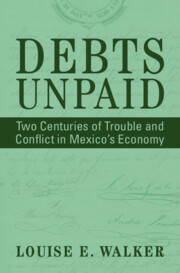4 - Bad Cheques
Property Crime and the Moral Economy of Financialisation, 1930s–1980s
Published online by Cambridge University Press: 04 November 2025
Summary
In the aftermath of the Mexican Revolution, bankers thrust the disciplinary power of the state between debtors and creditors. They used their influence to criminalise the act of writing an uncovered cheque as fraud. From 1932 until 1984, debtors who wrote bad cheques to guarantee loans faced serious consequences, from fines to jail time. By examining approximately 115 arrest records, Chapter 4 uncovers the early history of financialisation, as more people began to use new financial instruments. When people wrote uncovered cheques, some of them experienced first-hand the growing pains that came with participating in financial modernity. Cheques represented the new dynamics of economic citizenship at mid-century, as the political elite of the PRI shored up the interests of bankers at the expense of bank account holders. As this chapter shows, the criminalisation of bad cheques facilitated the emergence of financial capitalism by establishing new kinds of property rights and creating a new white-collar crime. In the process, political leaders introduced new forms of coercion into the debtor–creditor relationship that left debtors more vulnerable than ever.
Keywords
Information
- Type
- Chapter
- Information
- Debts UnpaidTwo Centuries of Trouble and Conflict in Mexico's Economy, pp. 134 - 167Publisher: Cambridge University PressPrint publication year: 2025
